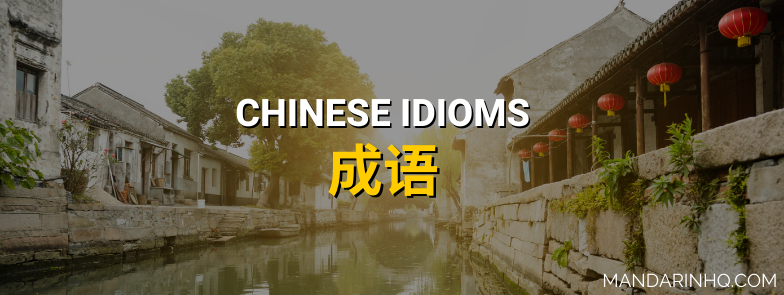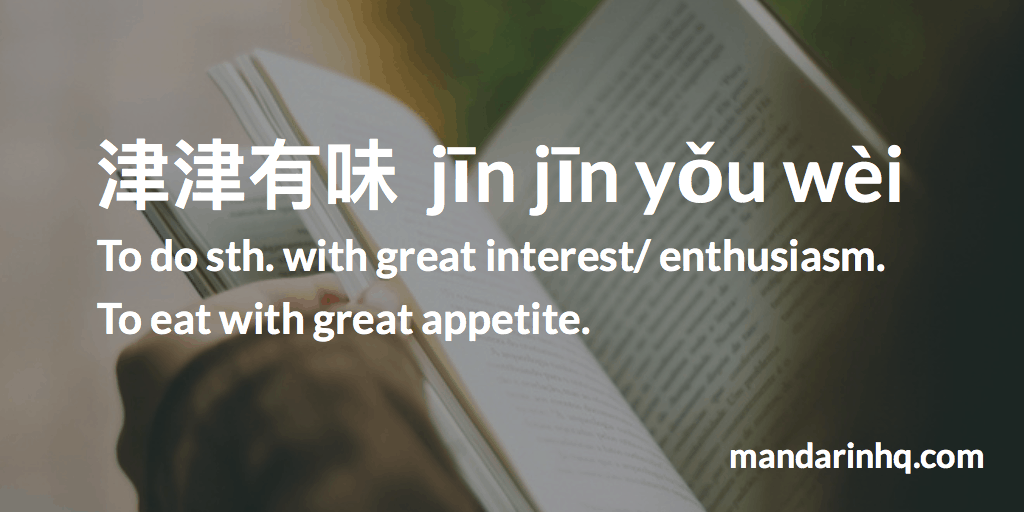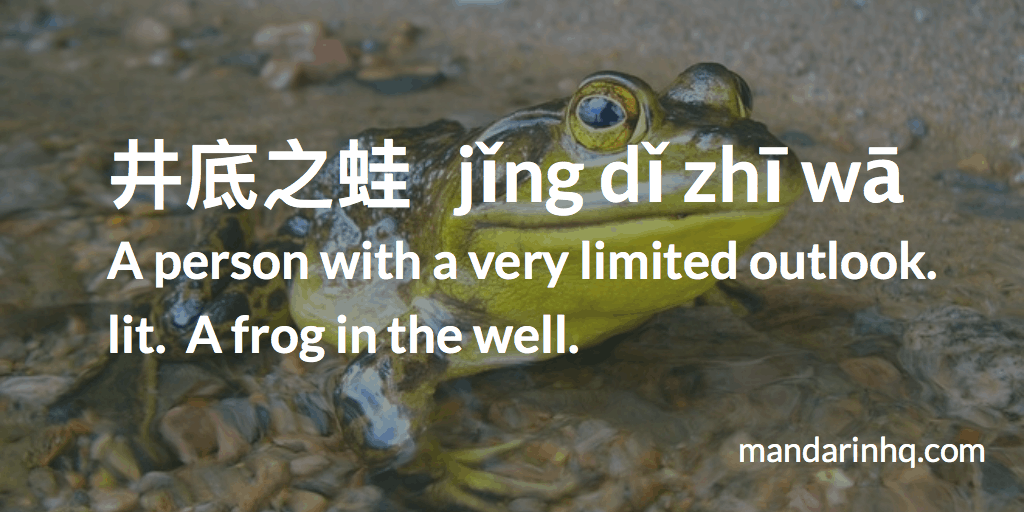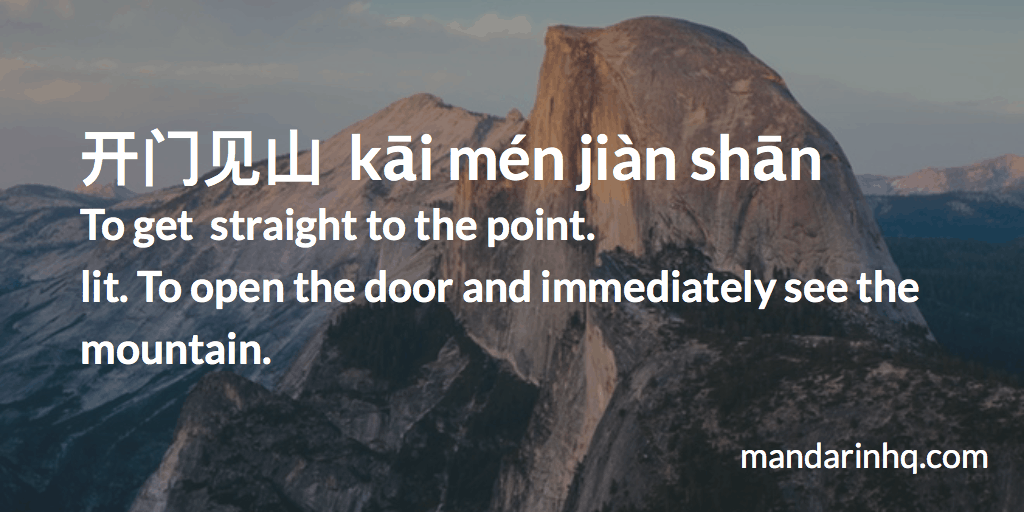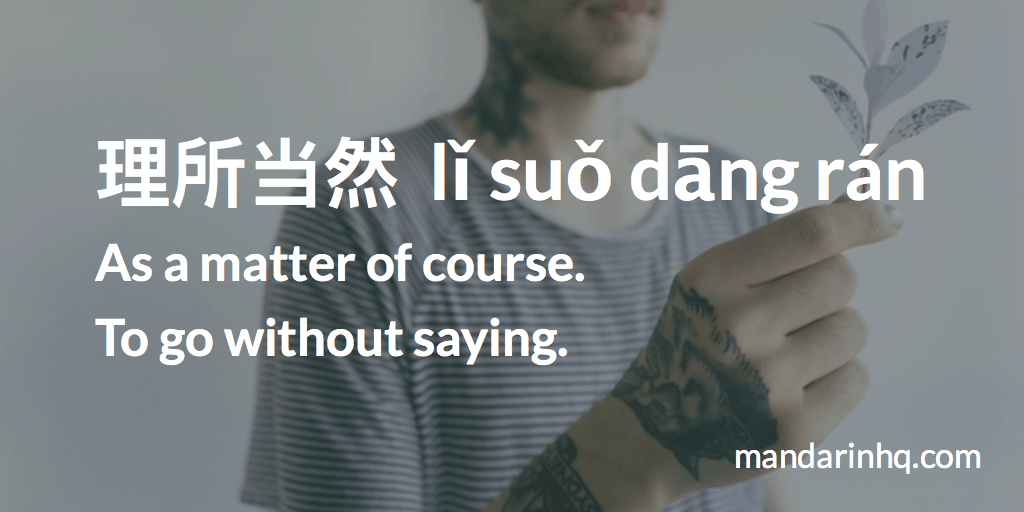This is part 6 of a 10 part series in which you'll learn a total of 60 Chinese idioms!
How do you say that someone "goes all in" or does their very best in Chinese? And which idiom describes someone who has a "very limited outlook"?
These are some of the popular 成语 (chéngyǔ) we'll cover in today's lesson.
Let's get started!
Useful Chinese Idioms [34-39]
津津: 兴趣浓厚的样子。
jīn jīn: xìng qù nóng hòu de yàng zi.
jīn jīn: A look of great interest.
有味: 很有味道。
yǒu wèi: hěn yǒu wèi dào.
yǒu wèi: It's really flavourful.
津津有味: 指吃得很有味道或谈得很有兴趣或看得很兴趣。形容兴味特别浓厚。
jīn jīn yǒu wèi: zhǐ chī de hěn yǒu wèi dào huò tán de hěn yǒu xìng qù huò kàn de hěn xìng qù. xíng róng xìng wèi tè bié nóng hòu.
jīn jīn yǒu wèi: It refers to eating with great taste or talking with great interest or watching with great interest. It's used when someone does something with great interest or gusto.
Example:
tā
jīn jīn yǒu wèi
de dú zhe zhè bù shū.
他津津有味地读着这部书。
He’s reading
the book
with great interest.
井:水井
jǐng: shuǐ jǐng
jǐng: A water well
底:底部。
dǐ: dǐ bù
dǐ: Bottom
之:的
zhī: de
zhī: A possessive particle
蛙:青蛙
wā: qīng wā
wā: A frog
井底之蛙:意思是指水井底部的青蛙认为天空只有井口那么大。比喻那些见识短浅的人。
jǐng dǐ zhī wā: yì sī shì zhǐ shuǐ jǐng dǐ bù de qīng wā rèn wèi tiān kōng zhǐ yǒu jǐng kǒu nà me dà. bǐ yù nà xiē jiàn shí duǎn qiǎn de rén.
jǐng dǐ zhī wā: It means that the frog at the bottom of the well thinks that the sky is only as big as the entrance of the well. It's a metaphor to describe people that have a limited outlook.
Example:
tā shì jǐng dǐ zhī wā.
他是井底之蛙。
He is a person with a very limited outlook.(narrow-minded)
开门:打开门。
kāi mén: dǎ kāi mén.
kāi mén:Open the door.
见山:看见山。
jiàn shān: kàn jiàn shān.
jiàn shān: See the mountain.
开门见山:打开门就能看见山。比喻说话或写文章直截了当,一开始就进入正题。
kāi mén jiàn shān: dǎ kāi mén jiù néng kàn jiàn shān. bǐ yù shuō huà huò xiě wén zhāng zhí jié liǎo dàng, yī kāi shǐ jiù jìn rù zhèng tí.
kāi mén jiàn shān: Open the door and you can see the mountain. Talking or writing figuratively is straightforward, and gets to the point right from the start.
Example:
wǒ men jiù bié rào wān zǐ le ,kāi mén jiàn shān de tán ba.
我们就别绕弯子了,开门见山地谈吧。
Let’s skip the small talk and get straight to the point.
理:道理
lǐ: dào lǐ
lǐ: Reason
所:所以
suǒ: suǒ yǐ
suǒ: So
当然:应当这样。
dāng rán: yīng dāng zhè yàng.
dāng rán:As it should be / of course.
理所当然:意思是道理当然是这样的,义为情理之中发生的,合乎情理的,不容怀疑。
lǐ suǒ dāng rán: yì sī shì dào lǐ dāng rán shì zhè yàng de, yì wèi qíng lǐ zhī zhōng fā shēng de, hé hū qíng lǐ de, bù róng huái yí.
lǐ suǒ dāng rán:It means that the truth is of course like this, and righteousness occurs within reason, which is reasonable and cannot be doubted.
Example:
tā de huāng miù fāng àn lǐ suǒ dāng rán de huì bèi jù jué le.
他的荒谬方案理所当然地会被拒绝了。
It goes without saying that his absurd proposal will be rejected.
落叶:飘落的枯叶。
luò yè: piāo luò de kū yè.
luò yè: Fallen leaves.
归根:回归到树木的根部。
guī gēn: huí guī dào shù mù de gēn bù.
guī gēn: Return to the root of the tree.
落叶归根:意思是比喻事物有一定的归宿。多指客居他乡的人,终要回到本乡。
luò yè guī gēn: yì sī shì bǐ yù shì wù yǒu yī dìng de guī sù. duō zhǐ kè jū tā xiāng de rén, zhōng yào huí dào běn xiāng.
luò yè guī gēn: It means that things have a certain destination. It mainly refers to people who live in foreign countries and will eventually return to their hometowns.
Example:
yé ye yóu lì le xǔ duō dì fang, xiàn zài luò yè guī gēn yòu huí dào le zhōng guó.
爷爷游历了许多地方,现在落叶归根又回到了中国。
My grandpa has traveled a lot but he has now returned home to China once and for all.
全力:全部的力量
quán lì: quán bù de lì liàng
quán lì: Full strength.
以赴:用来前往,或者投入
yǐ fù: yòng lái qián wǎng, huò zhě tóu rù.
yǐ fù: To go to, or to put in.
全力以赴:意思是投入全部的力量去做一件事情。
quán lì yǐ fù: yì sī shì tóu rù quán bù de lì liàng qù zuò yī jiàn shì qíng.
quán lì yǐ fù: It means to put all one's energy into doing one thing.
Example:
tā quán lì yǐ fù qù yíng dé bǐ sài.
他全力以赴去赢得比赛。
He does his very best to win the game.
You might also find these posts interesting:

